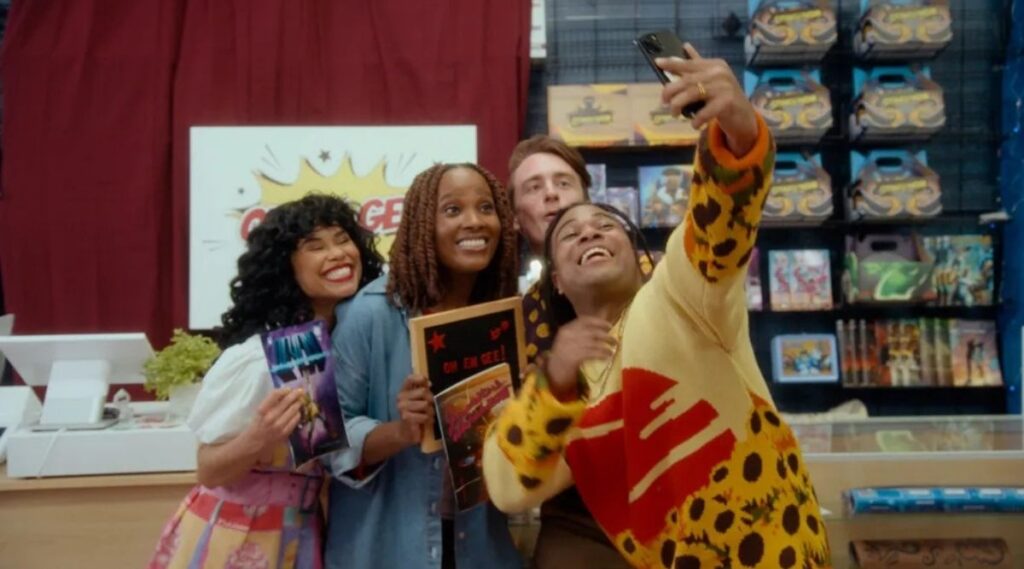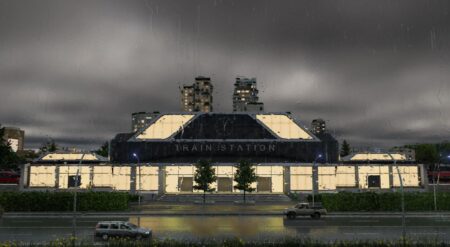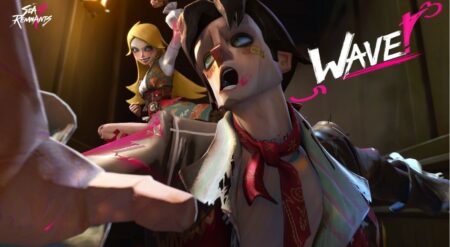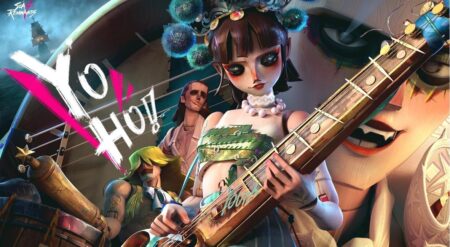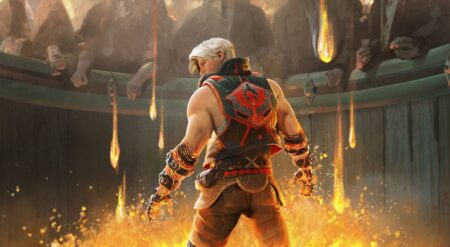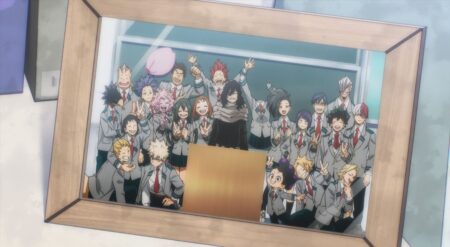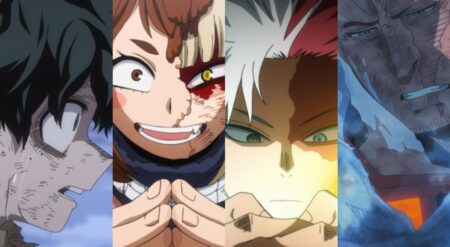Comic shops aren’t just retail spaces. They’re community hubs, nerd sanctuaries, and the place where countless fans first feel like they belong. For Cheyenne Ewulu, better known online as Cheyenne the Geek, they’re also the setting of her passion project, The Comic Shop, a workplace comedy that premiered August 29 on YouTube.
Ewulu has worn many hats in geek culture — writer, actress, host — but with The Comic Shop, she’s finally stepping into the role of creator on her own terms. Funded through one of Kickstarter’s most successful TV campaigns, the series is Ewulu’s answer to years of industry “no’s.” “Really, the dream for me is feeling creatively fulfilled, and I feel like with this journey, I’ve definitely achieved that,” she told us.
Ewulu didn’t take the studio system route. After being told more than once that a workplace comedy in a comic shop “wouldn’t sell,” she doubled down on doing it herself. “It’s not glamorous. There’s nothing glamorous about it,” she said. “You gotta really believe in your project enough to see it through.”
The Comic Shop’s Pilot starts on Free Comic Book Day and wastes no time introducing its characters.
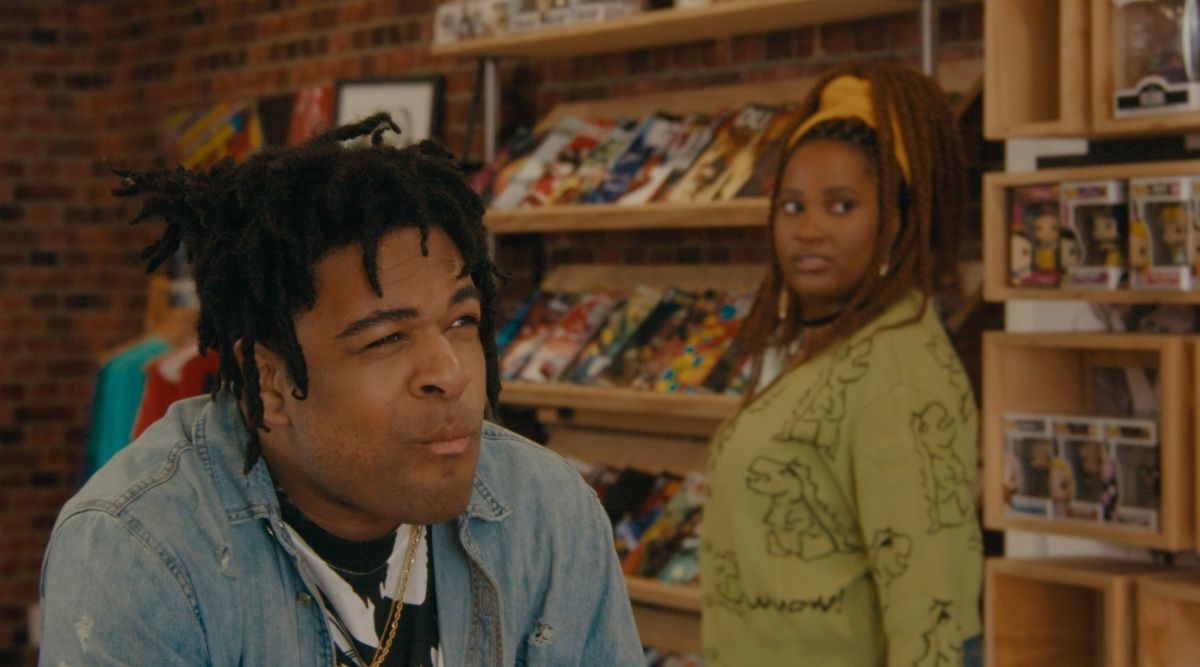
That belief carried her through the grind of raising money on Kickstarter, building a crew out of trusted friends-of-friends, and filming in Los Angeles: one of the most expensive cities in the world for indie production. The result is a show born from what she calls a necessary delusion. “Be delusional, you have to have delusions… and with that comes betting on yourself.”
The 15-minute pilot wastes no time in setting the tone. Much like Ewulu described in our conversation, the episode is a straightforward introduction: Free Comic Book Day at OMG Comics, the Core Four trying to make rent, and the chaos that follows.
We meet each character quickly and get a feel for their rapport, which works because the show is self-aware about what it’s doing. One line near the end even nods to it directly: “I think our uniqueness and passion for comics are what’s going to keep the people coming in.”
That self-awareness is key. It keeps the comedy grounded while giving the cast space to establish themselves. As a viewer, I found myself wanting more time with them. Not because the pilot underdelivered, but because the episode’s short runtime left me curious to see how much deeper each character’s quirks and stories could go.
The characters in The Comic Shop represent the full spectrum of fans.
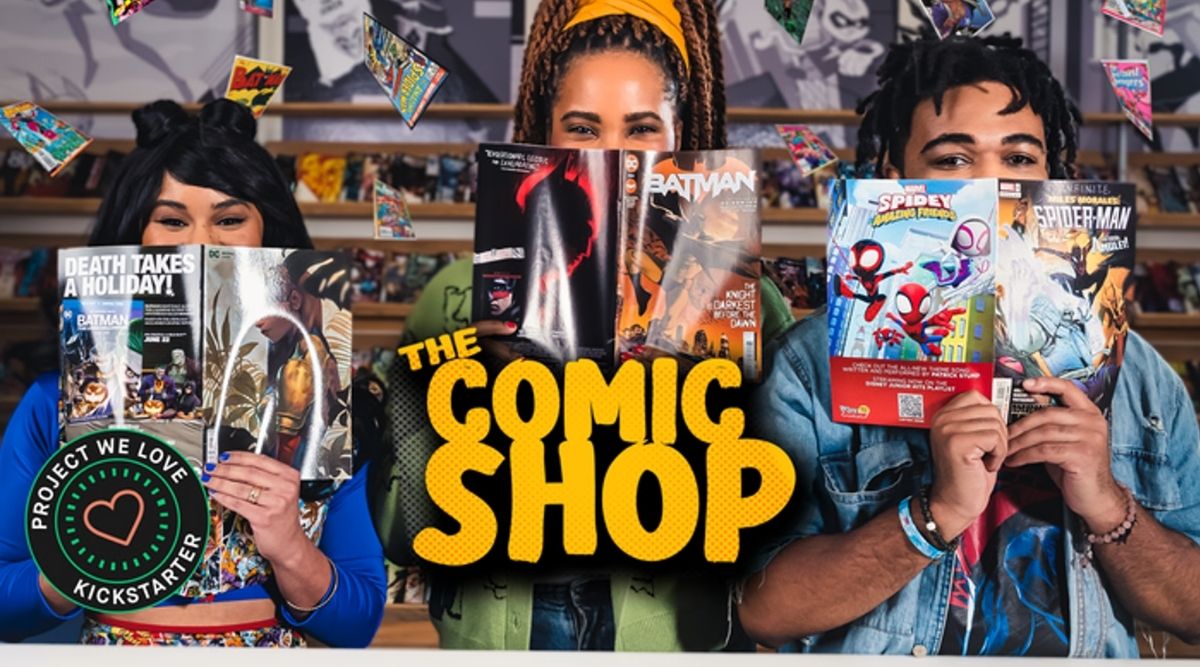
That’s by design. Starting with the ensemble, each episode will then spotlight a different character, digging into why they are the way they are. Episode 2 focuses on Stephanie, Episode 3 on another member of the Core Four, and so on, giving the series both sitcom energy and character-driven arcs.
The pilot introduces the “Core Four”: Stephanie (played by Ewulu), Keith (Zeno Robinson), Connor (Grayson Niles), and Dominique (Shanae Cole). Keith’s the guy with all the bright ideas that rarely pan out. Stephanie’s an anxious perfectionist with mom issues.
Connor is the Nepo baby cut off by his rich parents. Dominique is the fashionista nerd whose fandom is evident in her style. Together, they represent the spectrum of fans you really do meet in a comic shop, despite some early critics online who claimed otherwise.
Ewulu brushed that criticism off: “Stephanie is literally a self-insert. If somebody else has a different vision of what comic book workers look like, go make that show. We need more. I’m just making what I know.” For her, that meant not just drawing on fandom but also her own life as a first-generation Nigerian-American.
Stephanie mimicking her mother’s accent, for example, isn’t just comedy; it’s part of Cheyenne’s lived experience. “That’s what we do all the time. All we do is mimic our parents,” she said, laughing. It’s one of the many personal details that make Stephanie’s quirks feel authentic, rather than written in.
I couldn’t help but laugh at Kiki’s appearance as a snooty journalist character, the kind of too-cool-for-this attitude you see all the time in fandom spaces, whether it’s indie press overreaching or seasoned critics looking down at the scene. It’s a sharp little detail that signals Ewulu’s keen observance of these communities.
The Comic Shop is built on Cheyenne Ewulu’s keen observance of nerd communities.
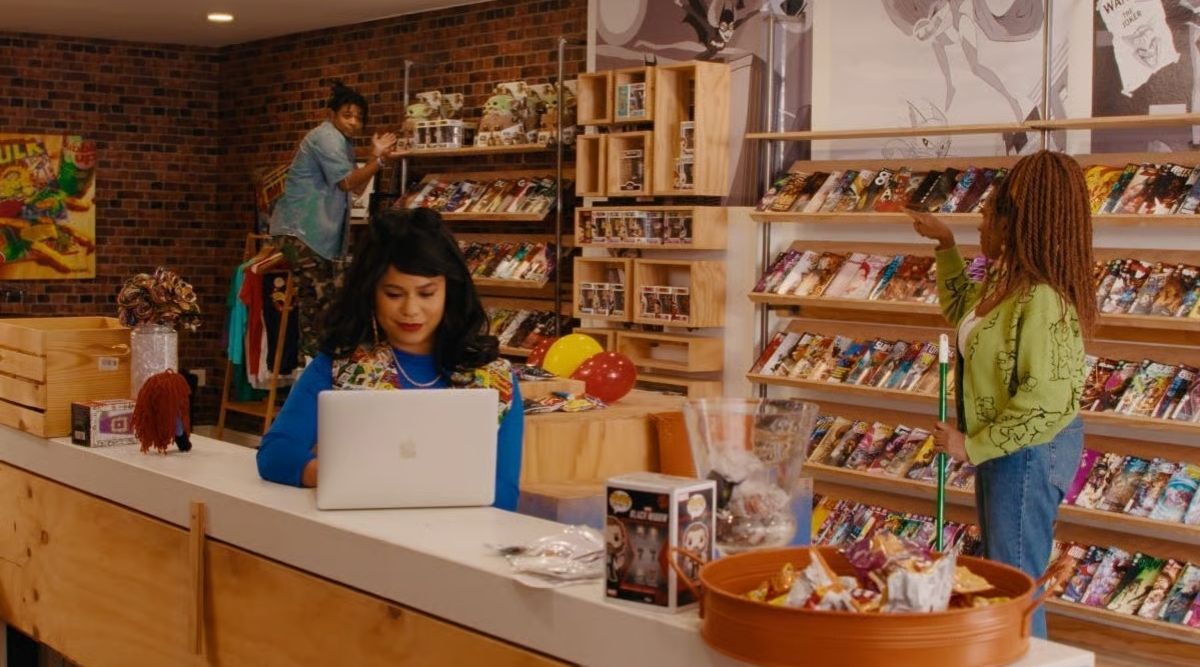
Authenticity mattered. Ewulu dreamed of shooting in a Black-owned comic shop, and fate delivered. The Comic Shop was filmed at The Comic Den in Ladera Heights, run by owner Joe, who she affectionately calls “the Mr. Rogers of comic books.” Walk in on any day and you’ll hear hip-hop playing, see a shelf dedicated to Black comic creators like Rodney Barnes, and maybe catch Joe in his house shoes, ready to educate anyone new to comics.
“He’s so wholesome,” Ewulu said. “Always willing to educate folks, never judgmental. That’s the energy I wanted in the show.” At the heart of The Comic Shop is Stephanie’s choice to use her grad school savings to open a comic store instead of following her parents’ plan.
It’s Ewulu’s own story, dramatized and exaggerated, but still painfully real. “Stephanie is me times a thousand,” she admitted. “I debated putting in some traumatic stuff from my life and turning it into jokes. But I thought, if I’m gonna go big, let me go big.”
The pilot frames this theme cleverly by tying it to Free Comic Book Day, a celebration of fandom and community that also comes with all the behind-the-scenes stress of keeping a shop alive. It’s instantly relatable for anyone who’s ever worked retail, run a small business, or simply worried about making rent.
The Comic Shop is a show especially meant for POC and queer nerds.
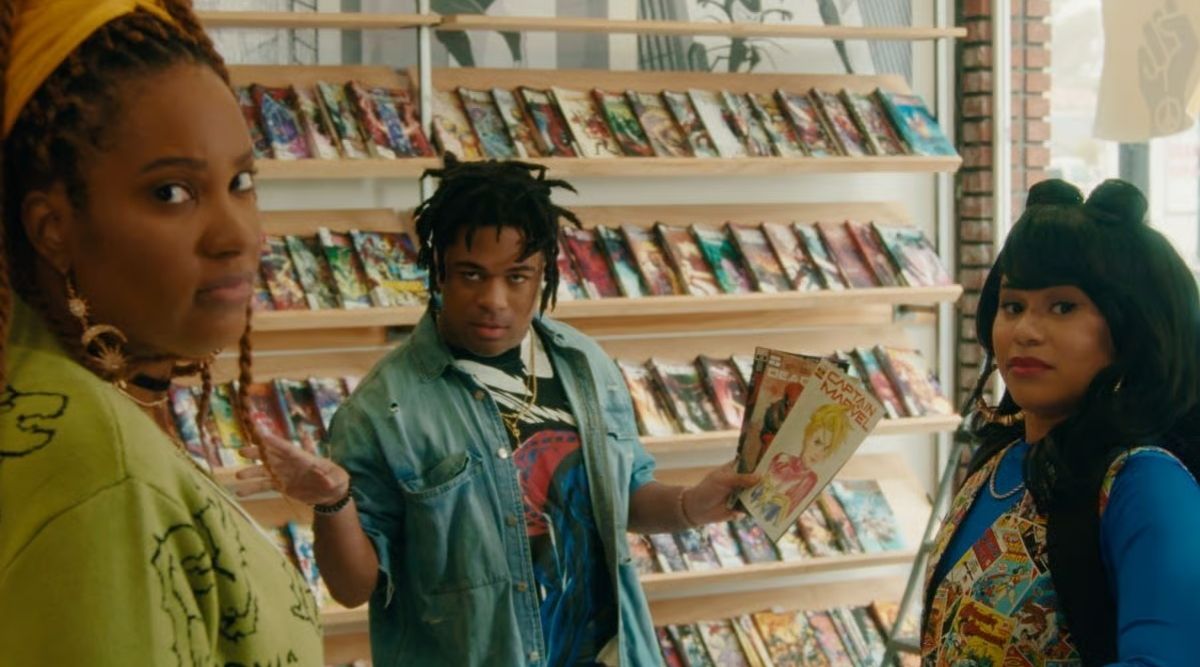
Ewulu didn’t grow up in comic shops. Her first love was DC animation: Batman Beyond, Justice League, Batman: The Animated Series. But when the New 52 era hit and she finally had “big girl money,” she walked into her first comic shop in Texas and dropped a bag on Nightwing comics.
“I literally walked in and said, Nightwing is my favorite character, where can I start? And everyone was so welcoming,” she said. Regulars explained variant covers, crossovers, and even gifted her a copy of Robin War when she couldn’t find one. That kindness stuck with her. “I never felt judged. It was like a breath of fresh air. That’s what I love about comic stores.” That sense of community carries directly into The Comic Shop.
Even the comics on screen reflect Ewulu’s ethos. Instead of chasing major IP, she filled the set with independent titles, like Newton Lilavois’ Keisha Demon Eater. Fans spotted the poster during filming at The Comic Den and started asking Joe if he carried it. Soon enough, he was stocking it on his shelves and selling out. “People loved it,” Ewulu said. “That’s the kind of indie energy I want the show to have.”
Kickstarter got the show made, but Ewulu is clear: crowdfunding again isn’t her dream. “It’s not easy to crowdfund, especially as a Black creative. Critical Role was a big inspiration for me to go that route, but ideally, I’d have an investor or producer step in. Not even a studio necessarily. Could just be a guy in a suit throwing me a briefcase,” she joked.
Still, she isn’t shutting any doors. If The Comic Shop connects, she’s ready for more seasons, bigger platforms, and yes, merch. “I’m open to whatever life throws my way. But the price is up.” Ewulu calls The Comic Shop a love letter to the Blerd community, but its scope is wider.
From the Core Four to the Inglewood setting, it’s a show meant for POC and queer nerds who rarely see themselves at the center of sitcoms about fandom. The pilot proves that vision works; it’s short, sweet, and full of potential.
Whether you’re a comic fan, a small business owner, a journalist, or someone trying to create for the first time, there’s something in The Comic Shop that speaks to you. And if Ewulu’s right, the best is yet to come.
The Comic Shop is streaming now on YouTube.

